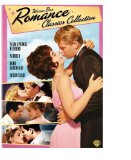| Reviews & Columns |
|
Reviews DVD TV on DVD Blu-ray 4K UHD International DVDs In Theaters Reviews by Studio Video Games Features Collector Series DVDs Easter Egg Database Interviews DVD Talk Radio Feature Articles Columns Anime Talk DVD Savant Horror DVDs The M.O.D. Squad Art House HD Talk Silent DVD
|
DVD Talk Forum |
|
|
| Resources |
|
DVD Price Search Customer Service #'s RCE Info Links |
|
Columns
|
|
|
Warner Bros. Romance Classics Collection (Parrish, Susan Slade, Rome Adventure, Palm Springs Weekend)
Pure, unadulterated escapism - with some intriguing ideas anchoring most of the films presented here. The Warner Bros. Romance Classics Collection gathers together four big, glossy, early sixties romances (three serious, one "funny") that just happen to star teen heartthrob, Troy Donahue. The titles include 1961's tobacco epic, Parrish, and teen pregnancy opus, Susan Slade, 1962's lush travelogue, Rome Adventure, and 1963's A.I.P.-ripoff, Palm Springs Weekend. Why Warners didn't label this The Troy Donahue Collection is a matter for speculation (I would imagine the marketing department - who probably never heard of Donahue until this crossed their desks - assumed no one else under fifty would know who he was, either). But calling it the The Delmer Daves Collection could have been just as viable (he directed the first three films) had Warners dropped the ill-fitting Palm Springs Weekend, and included Daves' final "big romance" sudser, 1964's Youngbloode Hawke (such is the frustration of these boxed sets). Fans of 50s and 60s Hollywood gloss like Peyton Place, From the Terrace, and A Summer Place will be the best fit for this big-screen fantasy trip back to the days of manufactured teen heartthrobs and romanticized reveries on class warfare and sexual politics (in other words: the same thing the studios are doing today).
PARRISH
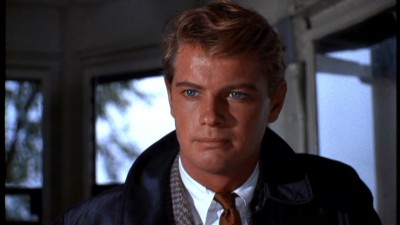
Parrish, Donahue's first starring role after his smash breakthrough supporting turn in A Summer Place, is based on the best-selling novel of the same name by Mildred Savage. With enough romantic subplots and permutations to choke a horse, Parrish's story can only be briefly outlined. Deciding that she will go to work as a companion/nanny/tutor for Connecticut tobacco farmer Sala Post's (Dean Jagger) wildcat daughter, Alison (Diane McBain), well-bred widow Ellen McLean (Claudette Colbert) can now save her son, Parrish (Troy Donahue), from a life of drudgery, working as a ferry boat deckhand. Arriving at the Post farm, Ellen soon learns that Parrish's presence wasn't expected - nor accepted - by Post, who doesn't want a young, handsome, teenaged-boy living at the same house as his daughter. So Parrish takes a room with Teet Howie (Dub Taylor), the earthy head of an all-women clan that works the Post's tobacco fields. Parrish is almost attacked by Teet's sister-in-law, Lucy (Connie Stevens); evidently the arrival of the handsome, clean-cut Parrish is irresistible bait for the man-hungry field hands.
Ellen also learns that power-hungry farmer Judd Raike (Karl Malden) has his sights set on acquiring Sala's property - one of the last holdouts in the area, and a thorn in his side. While Parrish becomes involved with Lucy, Ellen finds herself attracted to Judd's power and his money, and soon takes up with him...while questioning Parrish about his own "backstreet" affair with the common Lucy. It doesn't help matters when cold, grasping Allison returns home and falls for Parrish, too - which leaves Judd's younger daughter, Paige (Sharon Hugueny), out of the picture, because she has a yen for Parrish, too. Ellen's marriage to Judd forces a confrontation between Judd and Parrish (Parrish goes to work for the control-freak Judd, who, although his methods are bizarrely harsh, truly wishes to teach Parrish the tobacco game), Parrish and Allison, Parrish and Lucy (who becomes pregnant), Parrish and Paige, and Parrish and just about everyone else as the young man scrabbles to make a place for himself among the tobacco fields, with the girl he loves.
SPOILERS ALERT!
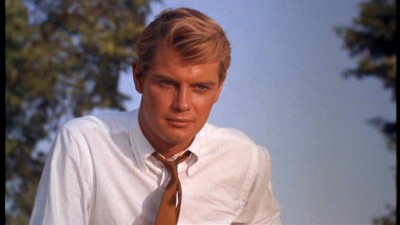
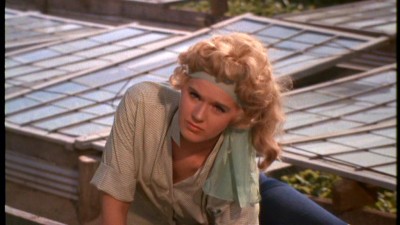
If you like big, sprawling, picturesque, glossy dramas from this time period, you really have to admire Parrish, even it frequently gyrates all over the place in terms of its confused plotline and its myriad romantic tensions. Not nearly as controlled and focused as Daves' and Donahue's previous high-budget sudser, A Summer Place, Parrish still delivers the goods as far as high melodramatic moments interspersed among the gorgeous widescreen shots of Windsor, Connecticut (who knew they grew tobacco in Connecticut?), while trying to cram as much plot as will go into the film's 138-minute running time. While that gambit, ultimately, doesn't work (the final third of the film is frenetically rushed, with major subplots introduced and carted off without proper attention, while important threads are left dangling), the sheer chutzpah of the effort - along with some surprisingly intriguing ideas behind the effective dramatic scenes - should be acknowledged and appreciated.
Daves, knowing full-well the impact he created with the widescreen vistas of the fairy tale-like visual schematic for A Summer Place, puts his camera into full bucolic mode for the farming scenes in Parrish. At times looking like the equivalent of a Life magazine layout, Parrish has that picturesque stage-setting quality that's necessary for the audience to feel like they've been "taken away" to another location they've never experienced or thought about - which naturally heightens the dramatic and romantic atmosphere of the story. Daves, giving us ample access to the process of how "tented" tobacco is grown, further piques our interest from a pictorial standpoint (cinematographer Harry Stradling, Sr.'s compositions are exquisitely "correct" and lush), while providing a visual metaphor for Parrish's education in both farming and love. He's no different than the young tobacco plants we're shown, which are lovingly described by the farmers as "babies." Parrish, naive to the ways of the more earthy farmers - as well as sheltered and pampered compared to Judd's almost-homicidal instruction in the art of tobacco farming - will struggle and flourish alongside the tobacco plants we're constantly cutting back to in the film.
Continuing his thematic formula established in A Summer Place, the notion of reaching some kind of understanding between the generations is explored, with Sala openly lamenting not understanding his "unpredictable" daughter, Allison, with Ellen remarking, "Hasn't that always been the way?" - a typically Davesian appreciation for the "more things change, the more things stay the same" philosophy of life. As well, the rules of sexual attraction - and the consequences we face from our actions - are also given a work-out here in Parrish. Initially, the commotion Parrish causes among the sexually active field hands is treated in an almost jokey manner (two girls' advances are so strong, they cause naive Parrish to flee, falling over himself in an effort to escape). As well, the set-up of having Parrish bunk in an almost-all female house, is played up for all it's worth, with the audience prepped for some hot, sweaty action. And Daves delivers it, too, with almost comical directness, as Connie Stevens makes it immediately clear she's available to Donahue (in their first day together, she tells him she sleeps in the "raw;" she asks him to kiss her, and that he only has to tap on the floor and she'll be available - no wonder her grandmother declares loudly, "Lucy is going to hell!").
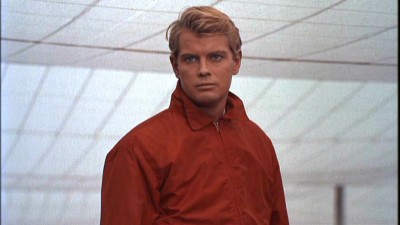
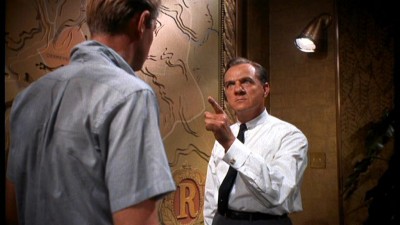
But soon, things get complicated, as Ellen questions Parrish' relationship with Lucy (unkindly referring to her as "training" in young Parrish's life, as well as a potential "habit" that can be worse than a "convenience" for a man), while she herself enjoys the company (and one would assume sex, as well) of Judd - a hypocrisy that Teet points out when Parrish drops Lucy, and becomes uncomfortable with his mother's new relationship ("Your 'freedom kick" is okay for you...but not for your ma?"). As well, Daves introduces further layering with the Allison character, whose "better" breeding actually covers up a looser attitude towards sex - as well as an avaricious attitude towards "buying love" - that pales in comparison to the trampy but essentially honest Lucy (indeed, Allison, by the end of the film, is shown to be an almost-degenerate, enjoying other men outside her marriage). Unfortunately, Daves eventually abandons the Ellen/Judd complications in favor of rushing through the various plot points, leaving a hole in what could have been, ultimately, a far more effective film that looks at the way we learn about love (and sometimes mistake it for "security"), what we compromise to achieve it, and how we can sully ourselves in an effort to hang on to it - even if we know it isn't right for us (all of that is hinted at and worked up to with the Ellen/Judd relationship...before it's dropped altogether). Still, in the end, Parrish leaves us with quite a bit to think about - a rather remarkable achievement considering the expectations of the genre (it's just supposed to be pleasant, escapist fare), and the film's sometimes scattershot approach.
SUSAN SLADE
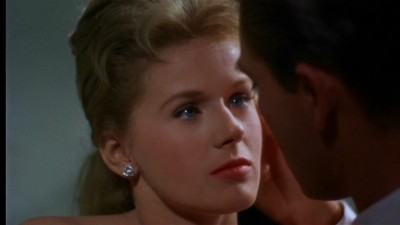
Certainly the weakest of Daves' high-gloss romances, Susan Slade may feature Troy Donahue headlining the credits, but he only shows up for about a third of the screen time here, with the emphasis squarely on Connie Stevens' character. Stevens plays Susan, the daughter of mining expert Roger Slade (Lloyd Nolan), who has been working and living down in Chile with his daughter and wife, Leah (Dorothy McGuire). Returning home to retire and conduct research for his company, Roger and his family board a cruise ship bound for California, where Susan meets Conn White (Grant Williams), a millionaire mountaineer. Obsessed with his friends who died on a mountain top, Conn still finds time to fall in love with Susan, and they become engaged.
Meanwhile, Roger's retirement gift - a spectacular oceanside home on the Monterey coast given to him by boss Stanton Corbett (Brian Aherne) - allows for enough space for Susan to get a pony for her birthday (no, she's not 12), a pony she boards at Hoyt Brecker's (Troy Donahue) stables. Hoyt, a young man with a chip on his shoulder since his father was convicted of embezzlement (from Roger's company) and committed suicide, becomes somewhat tentative friends with Susan, while she waits for Conn to return from an expedition on Mt. McKinley. But Conn never returns from his trip, and Susan finds out she's pregnant - a situation that demands her parents shield their child's shame by assuming parentage of the child. Roger takes a dangerous job (because of his heart condition) in the high mountains of Guatemala, while Leah tells everyone the baby is hers. After two years, the Slades return to California, but Susan can't deny her love for her baby any longer...nor can she decide between accepting Hoyt's love, or marrying dullard Wells Corbett (Bert Convy).
SPOILERS ALERT!
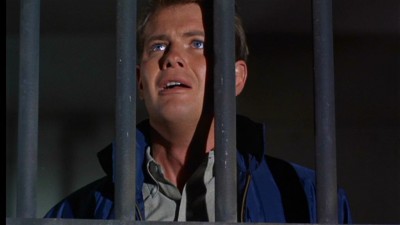
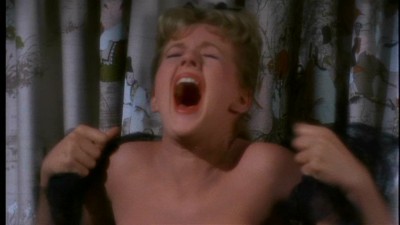
Whereas Parrish and the earlier A Summer Place had director/writer Delmer Daves' pictorially resplendent meditations of the rich versus the slobs hanging from some fairly intriguing themes and subplots, Susan Slade is straight, crude melodrama, without the intellectual or societal frills - and without much interest, either. It's nice to look at, but its construction is sloppy (particularly for Daves), lessening its impact, particularly when viewed between the superior Parrish and the upcoming Rome Adventure. There isn't anything remotely new or original in Daves' take on teen pregnancy here. Instead, we're always way ahead of the story and characters because they're so obviously stock. From the minute we understand that Susan's fiancé has a death wish (Grant Williams' scene where he shows his obsession to join his dead friends, is probably the best scene in the film, because it's pulled off with an "honest" mystical quality - it's the only part of this fairy tale that truly feels like a fairy tale), we can pretty much fill in the blanks. All of that nonsense about Susan feeling guilty about being "sinful," and her mother's mixed messages about being "careful" while she revels in her finally snagging a boyfriend, were by this point on 1962's movie screens, obvious and played out. Daves' attempts to slip in some A Summer Place teen anxiety scenes, like the "petting party" (which even has the self-promoting nerve to use Max Steiner's A Summer Place theme as the go-to make-out tune!), or Susan's worries about being a good kisser, seem calculated after-thoughts, as well.
Not helping matters is the main audience expectation that somehow Susan and Hoyt as a couple will be the central dramatic thread of Susan Slade - which strangely doesn't come to pass. As I wrote before, Donahue's work here is minimal (Susan Slade was rushed out in 1961 to capitalize on Parrish's success - perhaps he didn't have time with his TV show, as well, to have a larger part in it?), with the bulk of the film focusing on Susan dealing with her tribulations alone. Which would be fine, if we could understand the nature of her eventual relationship with Hoyt - which frankly doesn't make any sense at all. The few initial scenes that Donahue has with Stevens, we get the feeling that their relationship is going to be built up slowly, but then...he disappears. And right before Susan leaves for Guatemala, Hoyt is telling her he's going to miss her more than anything, and they kiss - where did that come from? Nothing in the film up to that point justifies that level of involvement between the characters, but there it is. And when Susan returns to American, we're given, all in a rush, the information that Hoyt sold stories to get her horse back, and that he wants to be free, while she looks after her baby...and none of it makes an impact because the center has been hollowed out: we never saw any of this relationship, so how can it be meaningful now?
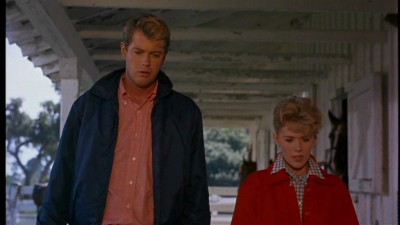
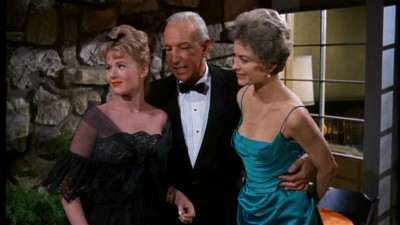
I can't say that Stevens is exactly a compelling actress (she screams loudly during her scene where she learns that Conn is dead, but screaming isn't acting), but it's probably unfair to lay too much of the blame for Susan Slade's failure on her shoulders (even though she's in almost every scene), since it's so poorly constructed and written. Donahue is away most of the time, so he doesn't have a chance to wear out his welcome, but Nolan does his usual shtick, while McGuire (another reminder of Daves' A Summer Place triumph) is bizarrely inappropriate in many scenes, particularly the one where she's smiling brightly while she explains how love is going to hurt her daughter (McGuire, a beautiful, sensitive actress, loses all the good points she scored in A Summer Place for this ill-toned performance). Ultimately, Susan Slade is for naught, because Daves can't effectively fashion his previous high-gloss, picturesque formula to this tired plotline (even the compositions aren't that special, with interior sets dominating). Susan Slade feels superficial, despite the high dramatics, and it never "takes us away" to a specific, identifiable place where we might have bought the romantic histrionics.
ROME ADVENTURE
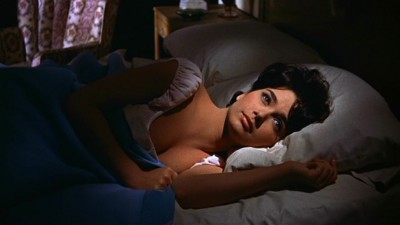
My favorite film in the Warner Bros. Romance Classics Collection, Rome Adventure pulls out all the stops of the Daves' travelogue/romance formula, going on-location to one of the most gorgeous cities on earth (and giving us spectacular views of it and Italy that we could never get from the inside of a tour bus), while predicating its involving story on a few intriguing, stimulating themes. It also helps that simply wonderful Suzanne Pleshette - certainly Daves' best actress in this phase of his career - is on board, rather than a Connie Stevens or a Sandra Dee.
Pleshette plays Prudence Bell (that name alone is priceless), an assistant librarian at the sniffy East Coast Briarcroft College for Women. Called out for keeping a banned book on the library's shelf, Pru tells off the old bags on the board and heads for Italy - she's going to stop reading about love, and start living it. Through a mix-up on the cruiseliner heading for Europe, Pru thinks her dock-side parents want her to hang out with suave Italian businessman Roberto Orlandi (Rossano Brazzi), who stands to the right of the pretty American, when they really want her to be chaperoned by Etruscanologist drip Albert Stillwell (Hampton Francher), who happens to be standing on her left. Both men watch over her on the voyage (after Roberto comes this close to bedding Pru when he admires her body), until they land in Rome. Roberto finds the two young Americans a good hotel to stay at, a hotel that just happens to house architect student Don Porter (Troy Donahue). Porter is coming off a bad breakup with rich, fickle man-eater Lyda Kent (legs-for-days Angie Dickinson). So after Pru gets a job with sadder-but-wiser bookstore owner Daisy Porter (Constance Ford), and after Pru and Don inevitably get together, and spend an idyllic vacation touring the various Italian delights, Lyda pushes her way in-between the lovers, with Pru seeking out Roberto for some lessons in il fare l'amore.
SPOILERS ALERT!
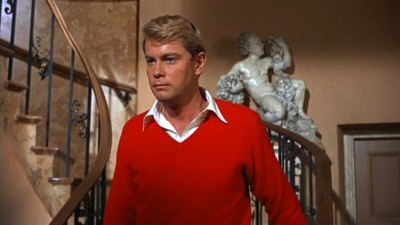
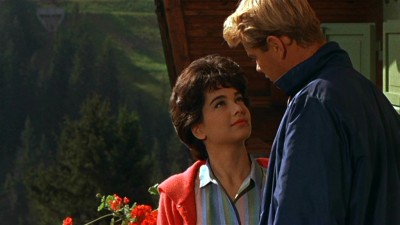
Lush, gorgeous, and impossibly romantic, Rome Adventure doesn't have to make any logical sense because clearly, director Daves has only one thing on his mind here: sensory overload (after all, it does have "adventure" in the title - why should it be bound by logic?). Spending quite a bit of screen time on presenting breathtaking travelogue shots of Italy (I don't know of another film from this period that shows off Italy so well), Daves sets the mood of the film as soon as Prudence lands in Italy, and he doesn't let up on the dreamy, dewy romantic shots until the satisfying finale. Often times playing like the equivalent of a romance novel (but in a good way), Rome Adventure is more interested in presenting emotional vignettes, seeped in semiology calculated to connect with the female audience, than it is in presenting a story which obeys conventional narrative logic. Of course it's ridiculous to think there would a "fairy godfather" as genial, as understanding, and as sexually accomplished, as the Roberto character here, who willingly shepherds Pru around, and backs off good-naturedly when she doesn't hear any bells - only to turn her down when she finally offers herself to him. Are there downbeat American bookstore owners in Italy who stayed once an Italian pinched their bottoms, like Daisy, who then meets men on her vacations for meaningless sex (sex that ultimately leaves her sad)? Maybe, maybe not. Those kinds of questions are entirely beside the point with a film like Rome Adventure, because Daves is telling a romantic fairy tale - albeit with some trendy sociological overtones, like sex before marriage, and the notion that lovers don't just "happen;" they have to be "trained" - a gloss of realistic drama that only adds to the romantic "carried away" feeling of the film. Those sociological overtones or gloss of "realistic" drama don't occupy Rome Adventure's center - or define it.
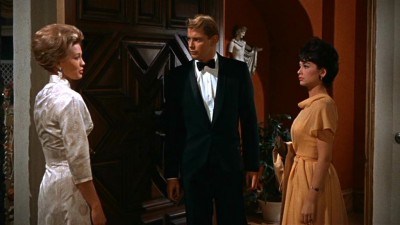
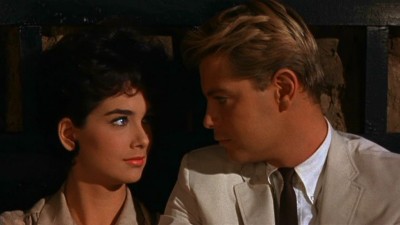
That being said, Rome Adventure is interesting for its above-board acknowledgment that Pru is heading off to Italy not so much for the architecture, but for love (and if that loves comes after sex, so be it). Whether or not you buy Daisy's assertions that a life consisting of sex without love is ultimately depressing, is up to you. And one may find it ridiculous that Pru feels the need to follow Daisy's advice to be "trained" by Roberto in order to hang on to Don. But clearly, Rome Adventure isn't prudish about Pru's sexual escapades - it's only concerned she won't be hurt by them. And to get that idea across, the film has to convince us that Pru and Don are indeed falling in love (thereby providing the set-up that Don will eventually hurt her when Lyda is back on the scene), which the film does quite well. Several "romantic set pieces" in Rome Adventure firmly establish this development, and in a heady manner for such a seeming trifle. When Don and Pru go off for an evening out on the town, they wind up in a dark, smokey little restaurant, listening to Emilio Pericoli sing Al Di La (interpreted by Don as meaning, "far, far away;" "beyond this world"). With the lights turned down low, and the candlestick the couple bought to commemorate their date gleaming on the table, Daves expertly switches back and forth between the singer and the couple, as Pru (Pleshette is remarkably good here), falls in love with Don, the music swelling up on the soundtrack, and the close-ups getting tighter, creating a palpable swoon effect on the viewer. Daves won't abandon that song, later playing it over the loud speakers as the couple ascends a mountain in a precarious lift basket - creating yet another romantic overload moment. Later, during the couple's journey to the Italian Alps, when they're preparing themselves emotionally to "seal the deal" with their relationship (an earlier scene showed them sharing a room, with Pru alone in her bed, awake, wondering, while Don slept on the balcony), Don discusses the prehistoric antecedents of tickling, as he sensuously tortures Pru with a feather (more symbolism for Daves, as he gets across the hunter and hunted theme, carried through to today's love affairs). Pleshette, in dreamy close-up, doesn't appear to be acting when she breathlessly tells Don that, "I tickle in other places, too," as he caresses her face and throat, leading up to her sexy, "Oh, yes...now!" declaration when he kisses her. Scenes like those (and they're plentiful among the visual delights of Italy), which create a tangible atmosphere of adventuresome, escapist romance, perfectly sum up the appeal of Rome Adventure.
PALM SPRINGS WEEKEND
"Here's to sex, sands, and suds!"

An ominous sign of how tenuous Donahue's relatively brief "star" status was (particularly after bouncing around on serial TV, as well - not a good career move for a hoping-to-be A-list leading man - in first Surfside 6 and then the last season of Hawaiian Eye), Palm Springs Weekend is a big come-down from the hefty, expensive Delmer Daves epics Donahue was fronting prior to this A.I.P.-inspired knock-off. Heading up a B-programmer with lots of familiar TV faces who were also having difficulty maintaining big-screen careers (Robert Conrad and Connie Stevens were fellow Hawaiian Eye alumni; Ty Hardin had been a hit on the western Bronco; while Jerry Van Dyke was all over the tube in 1963, including his disastrous turn on the ill-fated The Judy Garland Show), only reinforced the notion that Donahue had failed to cross-over into genuine A-list territory.
Joining the busloads of Los Angeles college teens who flood Palm Springs over the Easter break, medical student-on-an-athletic-scholarship Jim Munroe (Troy Donahue) and his basketball teammates are on their way for fun in the desert sun. Sidekick goofball Biff Roberts (Jerry Van Dyke) is hoping to find love with Amanda North (Zeme North) during his vacation via a little help from his "instant romance" machine (don't ask), while "Gayle Lewis"/Jane Hoover (Connie Stevens), an 18-year-old babysitter from L.A. passing herself off as a Beverly Hills princess, jumps the bus and scores a ride from hotshot/psycho, misunderstood rich kid, Eric Dean (Robert Conrad). Crashing at Naomi Yates' (Carole Cook) family-friendly motel (where she, too, strikes up a romance with blowhard Coach Fred Campbell, played by Jack Weston), Jim meets Bunny Dixon (Stefanie Powers), a sheltered "good girl" whose father just happens to be Palm Springs' Police Chief, played by Andrew Duggan. As Jim and Bunny fall in love and dance around the issue of sex versus love, Gayle discovers the true nature of Eric's intent, and looks to Hollywood stuntman/cowboy Doug "Stretch" Fortune (Ty Hardin), to come to her rescue.
SPOILERS ALERT!
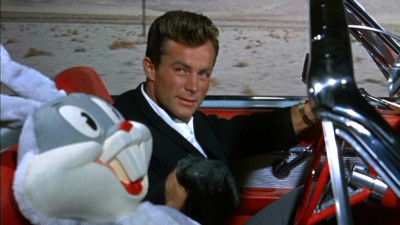
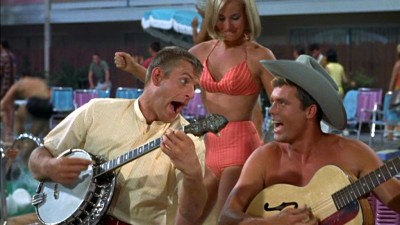
A curious, "second generation" genre picture, Palm Springs Weekend is a relatively cheap outing from a major studio, rushed out for late-fall release to cash in on the success of late-summer smash, Beach Party - a minor studio (A.I.P.) project that was ironically inspired by previous big-studio teen offerings like Gidget, Blue Hawaii, and Where the Boys Are. Playing very much like an Elvis picture without Elvis or his songs, Palm Springs Weekend embodies that studio "safe escapism" product designed for the early 60s teen set who may have not gone to college, or who couldn't afford an expensive spring break trip, or who were geographically land-locked from the sunnier, more glamorous climes of Fort Lauderdale or Palm Springs, but who read about such adventures in their glossy color Sunday newspaper supplements, or Life magazine, and who wanted a taste of that rich, carefree life for themselves.
Of course, Palm Springs Weekend's escapism is "safe" because the tried-and-true sexual gamesmanship on display here remains strictly above the sheets, with the promise of erotic danger (Donahue worried he'll "make a mistake" with Powers, Stevens' attraction to the predatory Conrad) trotted out for titillation's sake - not for serious drama (or comedy, for that matter). Much is made of laying out the ground rules for "safe play" during this seemingly hedonistic vacation break (at Tina Cole's pool party, it's beer only, swimsuits required in the pool, and the bedrooms are strictly off-limits), while characters enact the two most basic (and by this point in studio teen offerings, clichéd) sexual dynamics: Troy and Stefanie's push-me/pull-you battle over sex and marriage (with Stefanie almost breaking when she's ready to "give herself" to Troy); and Connie's dangerous game of flirting with Conrad's sexual dark side (watch the scene where Conrad, in his car, first beckons to Connie on the bus; he points right to his crotch - you can't get any more direct than that) , while the audience is screaming for her to hightail it out of there (to the film's credit, Conrad's aborted assault on Connie is played fairly realistically).
Scripted by The Waltons' Earl Hamner, Jr. (bizarre), Palm Springs Weekend offers up four basic models of young American males - like the Mystery Date board game which would become popular in a few years - for the approval of the female audience members: studious, hunky heartthrob Donahue; dorky yet fun-loving Van Dyke; big, strong, silent cowboy Hardin, and (if we follow the Mystery Date analogy and swap the "dud" for "headcase"), handsome, pint-sized dreamboat psychotic Conrad. Teen boys in the audience were given three equally potent all-American girl stereotypes: classy, studious, romantic, sheltered suburbanite Powers; hard-working-but-lying teenaged minx Stevens (who almost gets raped for hanging out with Conrad when all signs pointed towards "Run!"); and kooky, post-beatnik, Shirley MacLaine-like ugly duckling-turned-Jane Wyman (after a disastrous make-over), Zeme North. And as befitting a typical Norman Taurog production (a veteran studio journeyman who directed nine Elvis vehicles), none of these stereotypes are examined or altered or tweaked in the slightest. Troy and Stefanie come to an agreement (they'll marry), while Connie learns her place by putting back her hair for her new beau, Ty. It's all thoroughly familiar (with Troy's upbraiding of Conrad playing weirdly like a cross between every crybaby rich brat punk in movies getting his, and Troy's scene castigating his drunk father, Arthur Kennedy, in A Summer Place), with comedy set pieces that aren't funny by half (you can really tell that Warners wanted their money's worth out of that bubble-in-the-motel-swimming pool scene - it goes on forever), alternating against good-and-bad action scenes (the house party fight is well done, but the car chases are unintentionally humorous), and odd, disjointed time-fillers (Ty's and Jerry's duet on Bye Bye Blackbird). The performances range from distracted (Donahue looks puffy and too old - at only 27 - for the 21-year-old Powers), to inexplicable (Hardin), to grotesquely overblown (Weston, in a rare bad performance). This would be Donahue's last explicitly "juvenile" role; he would go on to make two more films under his Warner Bros. contract (both would fail with critics and audiences, alike), before he drifted off into pop culture oblivion (not even a cameo in The Godfather II by old school friend Francis Ford Coppola, could reignite his career).
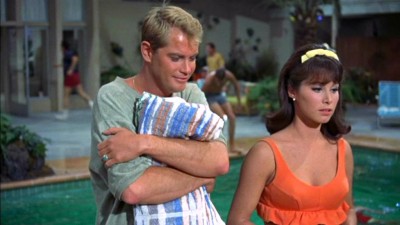
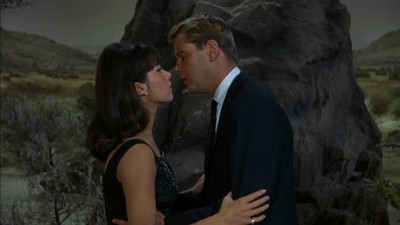
The DVD:
The Video:
All of the films presented in the Warner Bros. Romance Classics Collection are presented in extremely crisp, clean, anamorphically enhanced 1.85:1 widescreen transfers. Grain is an issue, at times, in Parrish, but that looks to be from the original elements, not a transfer issue. Colors are brightly valued, and there were no discernable compression issues. These look terrific.
The Audio:
All of the films in the Warner Bros. Romance Classics Collection are presented in big, fat Dolby Digital English mono - all of which have adequate loudness levels, with only minor, minor hiss. Rome Adventure also has a Portuguese mono track. English and French subtitles are included on all titles, while Rome Adventure also features Portuguese subtitles.
The Extras:
The only included extras, aside from Warners' continued (cool) policy of using the original poster artwork for their library titles, are original trailers for the films - and they're a hoot.
Final Thoughts:
Attention all dreamy romantics: Warner Bros. Romance Classics Collection is right up your alley, featuring three high-gloss sudsers (and one romantic comedy) featuring the boyish, clean-cut good looks of Troy Donahue. Delmer Daves enthusiasts will want this set to help complete their collections, too (while regretting Warners not including Youngbloode Hawke here instead of Palm Springs Weekend). All are at least interesting, while Rome Adventure is a swooning delight. I highly, highly recommend Warner Bros. Romance Classics Collection.
Paul Mavis is an internationally published film and television historian, a member of the Online Film Critics Society, and the author of The Espionage Filmography.


|
| Popular Reviews |
| Sponsored Links |
|
|
| Sponsored Links |
|
|
| Release List | Reviews | Shop | Newsletter | Forum | DVD Giveaways | Blu-Ray | Advertise |
|
Copyright 2024 DVDTalk.com All Rights Reserved. Legal Info, Privacy Policy, Terms of Use,
Manage Preferences,
Your Privacy Choices | |||||||









